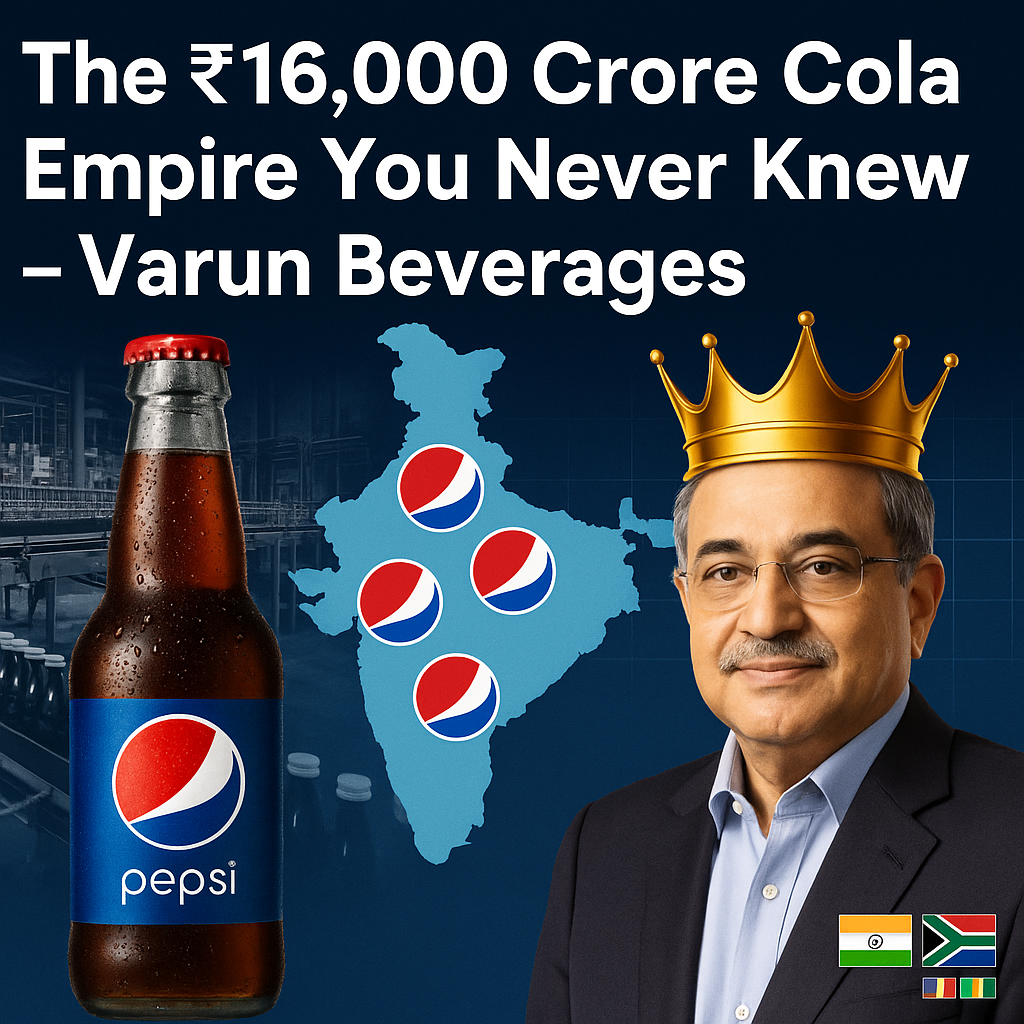Introduction
This in fact, all of these are not made by Pepsi, but by a 30-year-old company that you might never have heard of. A company that made about ₹16,000 crore in revenue and about ₹2,000 crore in profits last year. They are the fourth most valued FMCG company in the country, with a higher market cap than giants like Dabur and even Tata Consumer Goods.
We’re talking about Varun Beverages — a rare company that has given its investors 18 times the return since its IPO in 2016. Today, let’s uncover the three major insights on how Varun Beverages reached here and how Ravi Jaipuria became India’s ultimate Cola King.
The Unusual Origins of Ravi Jaipuria: India’s Cola King
Ravi Jaipuria isn’t your regular business tycoon. He’s not just the man behind the Pepsi you drink but also the force behind pizzas and chicken wings from brands like KFC and Pizza Hut, through the QSR giant Devyani International. He is the founder and chairman of RJ Corp, the parent company of both Varun Beverages and Devyani.
Ravi comes from a lineage where business runs in the blood. His father, Chunilal Jaipuria, was a serial entrepreneur, co-founded Bank of Rajasthan, and was a Coca-Cola bottler in the 1960s. In 1977, Chunilal was also the official bottler for Campa Cola. In 1985, Ravi received one bottling plant as part of his family’s wealth, which laid the foundation for Varun Beverages, securing its first Pepsi contract in 1991.
Insight #1: Scale – The Backbone of Varun Beverages
You might think Varun Beverages is just another contract manufacturer, fully dependent on Pepsi. But what if it’s the other way around?
Pepsi and Varun Beverages share a symbiotic relationship:
- Pepsi handles advertising, secret concentrate, trademarks, and R&D.
- Varun Beverages (VBL) takes care of production, logistics, sales operations, and installing VISI coolers in kirana stores.
This partnership works because Pepsi offloads its capital-intensive operations to VBL, reducing risk. Pepsi, in fact, faced losses in India for seven straight years till 2018. Outsourcing to VBL made business sense.
Key stats:
- 33 manufacturing plants across India
- Present in 27 States and 7 Union Territories
- 90% of Pepsi’s Indian volume sales come from VBL
In 2019, VBL acquired Pepsi bottling franchises for South and West India for ₹1,800 crore. They even bought out PepsiCo’s plants and rights from other bottlers to become the monopoly bottler for Pepsi in India.
Internationally, they now operate in 12 countries across South Asia and Africa, accounting for 1/5th of their revenue. Their playbook is simple: either manufacture or distribute Pepsi products in every market they enter.
Insight #2: Product Diversification
With a 22% CAGR in sales over 10 years, VBL’s revenues have grown 8X. They’ve achieved this not just through scale but diversification.
India’s per capita soft drink consumption is 24 bottles, compared to 270 in China and 1,500 in the US. Anticipating a health-conscious trend, VBL expanded beyond carbonated drinks to 9 categories:
- Energy drinks
- Soda water
- Juices
- Iced teas
- Dairy-based drinks
Low and no-sugar drinks now make up 40% of their product mix.
Flagship Products:
- Pepsi, 7UP, Mirinda
- Sting (90% market share, beat Red Bull)
- Aquafina (10% market share in bottled water)
- Tropicana, Slice, Gatorade
They’ve also diversified into snacks with exclusive distribution of:
- Lays, Doritos, Cheetos, KurKure Puffcorns
This builds long-term trust with PepsiCo and sets the stage for manufacturing more snack products.
Insight #3: Operational Excellence
Operating at massive scale requires tight operational control. VBL’s PAT margins have more than doubled from 5.7% in 2018 to 12.8% now.
How?
- Backward Integration:
VBL makes bottle preforms, crown caps, crates, and boxes in-house. One-third of their plants have full vertical integration, boosting margins by 3-5%. - VISI Coolers Strategy:
With 35 lakh retail outlets reached (out of India’s 1.2 crore), their last-mile visibility is strong. They’ve installed over 10 lakh branded fridges, adding 50,000 every year, driving cold availability and impulsive buys. This move alone greatly enhances consumer attention and brand salience.
Conclusion
Varun Beverages isn’t just a Pepsi bottler. It’s a strategic, diversified, and operationally excellent behemoth. From owning almost all of Pepsi’s bottling rights in India to expanding into international markets and other product categories, it has built a business moat hard to replicate.
With a 30-year partnership with Pepsi, Ravi Jaipuria has cemented his position as India’s Cola King. And Varun Beverages has become a rare story of scale, strategy, and execution in India’s FMCG space.
FAQs About Varun Beverages
Q1. Is Varun Beverages owned by Pepsi?
No. Varun Beverages is an independent company and PepsiCo’s largest bottling partner in India. They operate under franchise agreements with Pepsi.
Q2. Who is the owner of Varun Beverages?
Ravi Jaipuria is the founder and chairman of Varun Beverages. He also heads RJ Corp, the parent company.
Q3. How much revenue does Varun Beverages generate?
As of the last fiscal year, Varun Beverages generated ₹16,000 crore in revenue and ₹2,000 crore in net profit.
Q4. Does Varun Beverages operate outside India?
Yes. VBL operates in 12 countries across South Asia and Africa, accounting for 20% of its revenue.
Q5. What products does Varun Beverages manufacture?
They manufacture and distribute PepsiCo beverages like Pepsi, 7UP, Mirinda, Sting, Tropicana, Slice, Aquafina, Gatorade, and more.
Q6. What makes Varun Beverages different from other bottlers?
Their scale, operational excellence (including vertical integration and VISI cooler strategy), and strong long-term partnership with PepsiCo set them apart.










